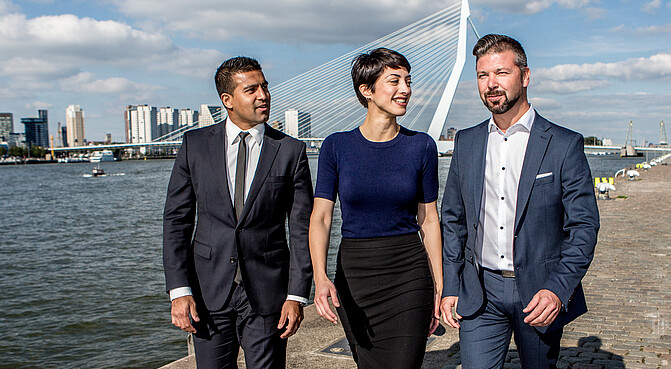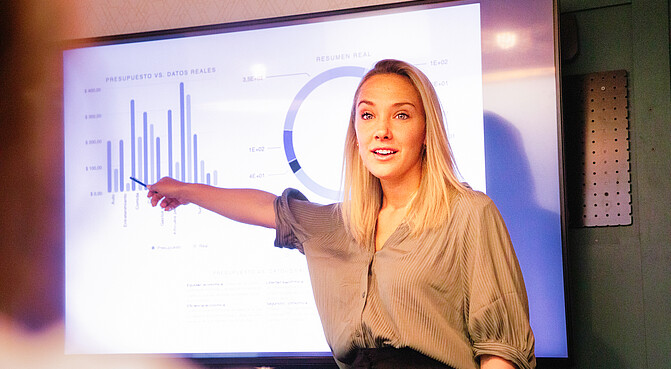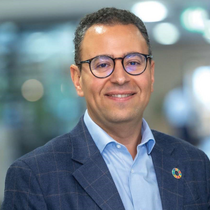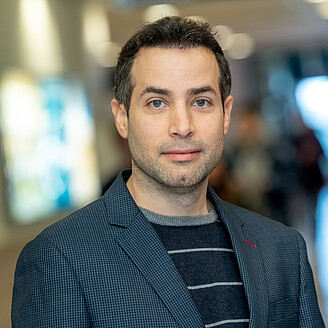Meet current and previous International GEMBA students.
To view the average class profile of Global Executive MBA cohort, please click here.

Complete your Global Executive MBA (GEMBA) over 21 transformative months. To help you develop as a strategic leader, our GEMBA programme offers you a highly personalised educational experience.
It includes a self-assessment of your development needs, (team) leadership challenge, personalised strategic leadership development plan, data-driven monitoring of your progress, one-to-one coaching, a choice of 3 electives and more.
Personal Leadership Development is interwoven throughout your Global Executive MBA experience. The Strategic Leadership Development track focuses on the development of the competencies that managers will need to bring to the table to successfully serve as a strategic leader. These skills and attitudes comprise a both personal leadership (PL) and strategic leadership (SL) component.
Because of its flexible, modular format, you will be able to experiment with new approaches learnt on campus back at the workplace as you progress.
If you would like to read more about the GEMBA curriculum, please click here*. To see the class calendar and see if this part-time programme is a fit for you, please click here.
*Please note: Curriculum may be subject to change. Location and number of GELs are subject to change.


Build a platform for your learning journey and lay the foundations for impactful management in a world that is in transition. You’ll learn how big data, artificial intelligence and the evolving internet economy affect decision-making and marketing. You’ll also explore concepts and techniques essential to operations and supply chain management.
- Strategic Leadership Development track (10 EC)
- Global Marketing Management (4 EC)
- This course integrates psychological and economic theories used in traditional marketing strategy with new insights and techniques based in data science to offer substantial efficiency in marketing endeavours. We will discuss the implications of big-data and the evolving internet economy on traditional durable goods as well as newly emerging product domains. Additionally, given the exceedingly interconnected world, we will discuss the social, environmental, and ethical implications of marketing in this new era.
- Managerial Decision Analysis (3 EC)
- Complexity in decision making comes from many factors. This course focuses on the difficulties arising from quantitative decision making in an environment with uncertainty and risk and presents different methodologies to deal with them in real-life problems. The course exposes you to common decision-making pitfalls and discusses how decision making is likely to change over the next decades due to the rise of Artificial Intelligence.
- Global Operations Management (4 EC)
- This course will introduce you to concepts and techniques that are essential for the design, planning, control and improvement of global service and manufacturing operations. You will explore topics such as capacity, inventory and supply chain management and learn basic tools for analysing operations problems, methods for managing an aspect of operations in a real situation, as well as providing a strategic view, typically using cases, of that aspect of operations.
- Topics in Global Business and Management (1 EC)
- The rapid changes in global business and society mean that new perspectives are needed to prepare strategic leaders for an uncertain future. This course will not only invite top-level executives, experts, and faculty to help you to envisage and understand which global mega-trends may be coming our way, but will also offer an introduction to some practical tools (such as scenario-analysis, for example) to help strategic leaders to navigate an uncertain future.
- Global Experiential Learning: Leading Digital Transformation & Study visit (3 EC)
Analyse the concerns of global strategic leaders: how can my firm outperform its competitors? How can we make decisions based on financial information? How can we manage people and develop the organisation with purposeful meaning?
- Strategic Leadership Development track (continued)
- Strategy in a Global Arena (4 EC)
- Strategic management is concerned with what is perhaps the most pressing issue for strategic leaders: how can I make my firm outperform its competitors? To formulate value-creating strategies, managers must identify core competencies, analyse industry environments, and develop new ways of outcompeting their rivals. The overall aim of this course is to help you to think like a strategist and contribute to C-suite level strategic decision-making.
- Financial Accounting and Analysis (3 EC)
- This course provides a common language and a toolbox to make rational decisions that involve monetary value. Understanding this subject matter will make you a more professional manager. Moreover, understanding the limitations of financial analysis and accounting will enable you to challenge management plans more effectively. This course gives you the foundational knowledge that any C-suite member needs to use and evaluate financial information and contribute to discussions and decision-making with respect to finance and accounting.
- Leading and Managing Global Organizations (4 EC)
- Managing people and organisational development is a mission critical C-suite competency that no business can afford to do without. Managers of globally active businesses need to continuously readjust their organisations to volatile or uncertain environments; navigate international and culturally highly diverse contexts; develop and engage with a competitive workforce based on the business’ value proposition; and engage in informed decision-making using evolving techniques such as people analytics, big data, and artificial intelligence. In sum, leading and managing a globally active organisation at a C-suite level requires specific knowledge, skills and attitudes. This course seeks to hone and develop these skills, so you can develop and lead organisations with purpose.
- Topics in Global Business and Management (continued)
- Global Experiential Learning: Leading Entrepreneurship and Venturing & Study visit (3 EC)
Dive deeper into key aspects of business through a range of electives. You will also take a look at strategic governance and discuss some of the toughest financial decisions senior managers have to take.
- Strategic Leadership Development track (continued)
- Elective 1 (3 EC)
- Elective 2 (3 EC)
- Elective 3 (3 EC)
- Topics in Global Business and Management (continued)
- Corporate Governance (3 EC)
- Corporate governance is about getting “the rules of the game” right within which firms can secure resources, develop their core activities and business models, secure their societal licence to operate, and create and capture value for their shareholders and stakeholders. Rather than presenting an optimal corporate governance set-up that suits all firms, we will discuss the ownership and governance choices ofthe firm as a matter of strategic design and decision-making.
- Corporate Finance in a Global Environment (4 EC)
- Visionary business leaders of the future need a toolbox that helps them to tackle some tough strategic decisions. In this course, we discuss some of the toughest financial decisions senior managers may have to take, such as: What is the best capital structure for my company? Should I diversify my company or should I focus, and what is the impact on my corporate cost of capital? What are the financial pros and cons of having a stock market listing versus being privately held? Given your company has a stock market listing, what can you do to improve the stock’s liquidity? How do you redistribute the net profits of your corporation?
- Global Experiential Learning: Leading Corporate Strategy and Development & Study visit (3 EC)
To wrap up your studies, you will apply foundational concepts and insights from economics to analyse some of the most relevant trends and issues in global businesses today.
- Strategic Leadership Development track (continued)
- Economics for Global Business Managers (3 EC)
- This course seeks to enable you to apply foundational concepts and insights from micro- and macro-economics to analyze some of the most relevant trends and issues in global businesses today. Specifically, this course will discuss concepts such as incentives and behavior, market power and market structures, asymmetric information, vertical integration, and outsourcing, for example, to analyze phenomena such as the international fragmentation in trade and FDI, economic crises and contagion, the role of multinationals in global business, regulation, trade agreements, as well as other current phenomena that are important for strategic leaders in global business.
- Global Experiential Learning: Leading with Impact in Emerging and Developing Economics & Study visit South Africa (3 EC)
Customise your knowledge and skills development. A wide range of approximately 30 electives is offered each year. Topics span multiple disciplines, including leadership, sustainability, finance and operations. In 2024, the elective offerings included, among many others, the following:
- Change management
- Managing corporate turnarounds
- Mergers and acquisitions
- Sustainable investing
- Strategy and consulting
- Corporate venturing
- Innovation ecosystems
- Finance for decision making
- Strategic sourcing
RSM’s GEMBA and EMBA students have the exclusive opportunity to engage with several C-suite executives through our Meet the Strategic Leaders sessions throughout their programmes.
This speaker series provides you with direct access to learn from influential global business leaders, fostering valuable insights and inspiring discussions. The sessions are part of the GEMBA curriculum.
Previous speakers have included:
World-class thought leadership on global business.
Our faculty are leading thinkers, researchers and practitioners of global business. Their research is published by top academic journals, and their expertise is regularly sought by the Financial Times, Harvard Business Review and a host of leading newspapers and media outlets. RSM professors investigate the most pressing and relevant dimensions of global management, and their thought leadership informs the decisions of C-suites and boards of some of the world’s leading business organisations.
Global scholars
RSM faculty research the most critical issues facing businesses around the world. From innovation to entrepreneurship to supply management and beyond, they shed critical new light on the challenges our organisations face in uncertain times. The Erasmus Research Institute of Management is ranked among Europe’s top three think tanks. Joining the EMBA programme at RSM will give you the opportunity to interact with world-class scholars on the critical issues that face your business and your leadership.
Industry leaders
No one understands today’s business climate better than those who actually navigate it every day — the leaders of industry and government. At RSM, you’ll get their expert perspectives first-hand, learning from big-name professionals who share invaluable insights about the real world, directly with you and your peers.
At RSM, we are porud to claim:
Faculty Members
You’re in good company.
Your journey at RSM does not end with graduation. On completing your GEMBA successfully, you join our global RSM alumni community; a world-class network of more than 50,000 change-makers. Our alumni span the globe and represent a diversity of industries and sectors.
We are a learning and support community offering all of our alumni a full range of services, from annual reunions to conferences, social events, educational sessions and discussion panels with experts. We also offer an exclusive service, RSM MentorMe, connecting current students with RSM alumni and to grow the spirit of RSM – to be a force for positive change that helps people and organisations to thrive worldwide.






















